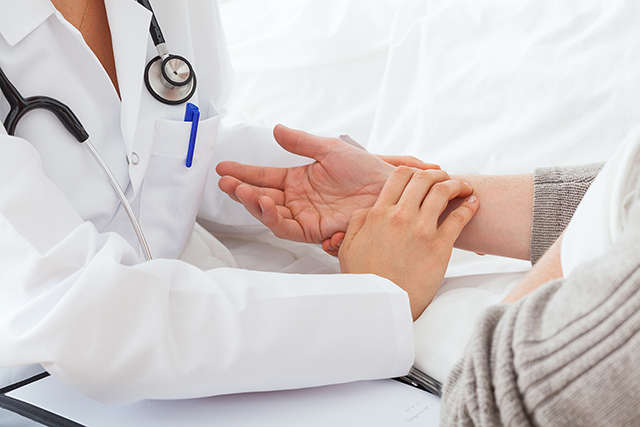Fainting is a brief loss of consciousness, which leads to falling down or needing to lie down, followed by a quick recovery.
In a young, healthy person, 1 episode of fainting is not usually cause for alarm, although, in rare cases, it can be a sign of a serious health condition. Syncope is usually caused by a sudden drop in blood pressure that results in decreased blood flow to the brain. You may have sweaty palms, dizziness, lightheadedness, problems seeing, or nausea before fainting.
In young people, the problem usually has no serious cause, although sometimes it can be due to an underlying heart problem. Triggers include:
- Severe emotional upsets
- Fear
- Standing for a long time
- Suddenly standing up
- Coughing very hard
- Dehydration or loss of body fluid
- Very rarely, stimulants, such as caffeine
An older person who has a fainting episode should call the doctor. It is important to have the cause of the fainting diagnosed.
Serious causes include:
- Abnormal heartbeat or other heart problems
- Anemia or blood loss
- Medication side effects
- Dehydration, although this is not very common
Most people who faint stay “out” a few seconds to less than a minute. If the person is unconscious for a longer time, call 911.
What to do
- Know your triggers or the things that can make you faint.
- Ask your doctor what you can do to prevent fainting. For example, your doctor may suggest that you:
- Get up slowly if you have been sitting or lying down for a long period of time, Exercising your legs while standing for long periods may help keep your blood moving.
- Have food or liquids containing salt, such as crackers, pretzels, or a sports drink. Salt will raise blood pressure, making a sudden drop less likely. But added salt isn’t good for many people who have high blood pressure, so you should ask your doctor before increasing your salt intake.
- If you feel like you are going to faint:
- Make sure you’re in a safe place, then sit down right away so you don’t fall and injure yourself.
- Lie down after you’ve safely reached a sitting position. Prop your feet up on some pillows or a jacket so that your feet are above the level of your heart. This raises blood flow to the heart and in turn the brain–exactly what you need.
- If you can’t lie down, place your head between your knees to increase circulation to your brain.
- Turn onto your side to prevent choking if you feel nauseated.
- If you do faint, remain lying down for 10 or 15 minutes once you wake up. Also, try moving your legs and then get up slowly.

